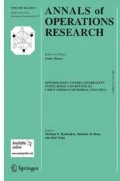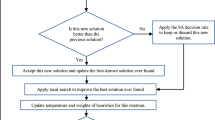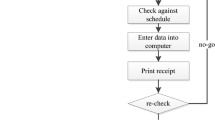Abstract
The importance of job shop scheduling as a practical problem has attracted the attention of many researchers. However, most research has focused on special cases such as single machine, parallel machine, and flowshop environments due to the “hardness” of general job shop problems. In this paper, a hybrid algorithm based on an integration of a genetic algorithm and heuristic rules is proposed for a general job shop scheduling problem with sequence-dependent setups (Jm|s jk |C max ). An embedded simulator is employed to implement the heuristic rules, which greatly enhances the flexibility of the algorithm. Knowledge relevant to the problem is inherent in the heuristic rules making the genetic algorithm more efficient, while the optimization procedure provided by the genetic algorithm makes the heuristic rules more effective. Extensive numerical experiments have been conducted and the results have shown that the hybrid approach is superior when compared to recently published existing methods for the same problem.
Similar content being viewed by others
References
J. Adams, E. Balas and D. Zawack, The shifting bottleneck procedure for job shop scheduling, Management Science 34 (1989) 391–401.
L. Bianco, S. Ricciardelli, G. Rinaldi and A. Sassano, Scheduling tasks with sequence-dependent processing times, Naval Research Logistics 35 (1988) 177–184.
B. Chen, C.N. Potts and V.A. Strusevich, Approximation algorithms for two-machine flow shop scheduling with batch setup times, Mathematical Programming 82 (1998) 255–271.
I.C. Choi and O. Korkmaz, Job shop scheduling with separable sequence-dependent setups, Annals of Operations Research 70 (1997) 155–170.
K. Chudzik and A. Janiak, Single machine scheduling with job ready and setup times-genetic approach, in: Proceedings of the 4th International Symposium on Methods and Models in Automation and Robotics, Miedzyzdroje, Poland (1997) pp. 1071-1075.
B.J. Coleman, Technical note: a simple model for optimizing the single machine early/tardy problem with sequence-dependent setups, Production and Operations Management 1 (1992) 225–228.
R.W. Conway, W.L. Maxwell and L.W. Miller, Theory of Scheduling (Addison-Wesley, Reading, MA, 1967).
H.A.J. Crauwels, C.N. Potts and L.N. Van Wassenhove, Local search heuristics for single-machine scheduling with batching to minimize the number of late jobs, European Journal of Operational Research 90 (1996) 200–213.
F.D. Croce, R. Tadei and G. Volta, A genetic algorithm for the job shop problem, Computers and Operations Research 22 (1995) 12–24.
S.R. Das, J.N.D. Gupta and B.M. Khumawala, A savings index heuristic algorithm for flowshop scheduling with sequence-dependent setup times, Journal of the Operational Research Society 46 (1995) 1365–1373.
S. French, Sequencing and Scheduling: An Introduction to the Mathematics of the Job Shop (Ellis Horwood, Chichester, 1982).
D.E. Goldberg, Genetic Algorithms in Search, Optimization and Machine Learning (Addison-Wesley, New York, 1989).
N.G. Hall, C.N. Potts and Chelliah Sriskandarajah, Parallel machine scheduling with a common server, Discrete Applied Mathematics 102(3) (2000) 223–243.
W. Huang and S. Li, A two-stage hybrid flowshop with uniform machines and setup times, Mathematical and Computer Modelling 27(2) (1998) 27–45.
H. Hwang and J.U. Sun, Production sequencing problem with reentrant work flows and sequence dependent setup times, Computers and Industrial Engineering 33 (1997) 773–776.
A. Janiak, Single machine sequencing with linear models of release dates, Naval Research Logistics 45(1) (1998) 99–113.
J.S. Kim, S.H. Kang and S.M. Lee, Transfer batch scheduling for a two-stage flowshop with identical parallel machines at each stage, OMEGA 25 (1997) 545–555.
S.A. Kravchenko and F. Werner, Parallel machine scheduling problems with a single server, Mathematical and Computer Modelling 26(12) (1997) 1–11.
S. Lawrence, Resource constrained project scheduling: An experimental investigation of heuristic scheduling techniques, GSIA Carnegie-Mellon University (1984).
Y.H. Lee, K. Bhaskaran and M. Pinedo, A heuristic to minimize the total weighted tardiness with sequence-dependent setups, IIE Transactions 29 (1997) 45–52.
Y.H. Lee and M. Pinedo, Scheduling jobs on parallel machines with sequence-dependent setup times, European Journal of Operational Research 100 (1997) 464–474.
G.K. Leong and M.D. Oliff, A sequencing heuristic for dependent setups in a batch process industry, OMEGA 18 (1990) 283–297.
C.L. Monma and C.N. Potts, On the complexity of scheduling with batch setup times, Operations Research 37 (1989) 798–804.
I.M. Ovacik and R. Uzsoy, A shifting bottleneck algorithm for scheduling semiconductor testing operations, Journal of Electronics Manufacturing 2 (1992) 119–134.
S. Parthasarathy and C. Rajendran, A simulated annealing heuristic for scheduling to minimize mean weighted tardiness in a flowshop with sequence-dependent setup times of jobs-a case study, Production Planning and Control 8 (1997) 475–483.
M. Pinedo, Scheduling: Theory, Algorithms and Systems (Prentice-Hall, Englewood Cliffs, NJ, 1995).
C.N. Potts and M.Y. Kovalyov, Scheduling with batching: a review, European Journal of Operational Research 120 (2000) 228–249.
C. Rajendran and H. Ziegler, A heuristic for scheduling to minimize the sum of weighted flow time of jobs in a flowshop with sequence-dependent setup times of jobs, Computers and Industrial Engineering 33 (1997) 281–284.
A.H.G. Rinnooy Kan, Machine Scheduling Problems: Classification, Complexity and Computations (Martinus Nijhoff, The Hague, 1976).
F.A. Rodammer and K.P.A. White, A recent survey of production scheduling, IEEE Transactions on Systems, Man, and Cybernetics SMC-18 (1988) 841–851.
J.M.J. Schutten and R.A.M. Leussink, Parallel machine scheduling with release dates, due dates and family setup times, International Journal of Production Economics 46-47 (1996) 119–125.
K.C. So, Some heuristics for scheduling jobs on parallel machines with setups, Management Science 36 (1990) 467–475.
G. Syswerda, Scheduling optimization using genetic algorithms, in: Handbook of Genetic Algorithms, ed. L. Davis (Van Nostrand Reinhold, New York, 1991) pp. 332–349.
K.C. Tan and R. Narasimhan, Minimizing tardiness on a single processor with sequence-dependent setup times: a simulated annealing approach, OMEGA 25 (1997) 619–634.
C.S. Tang, Scheduling batches on parallel machines with major and minor setups, European Journal of Operational Research 46 (1990) 28–37.
L.Wang and M.Wang, A hybrid algorithm for earliness-tardiness scheduling problem with sequence-dependent setup time, in: Proceedings of the 36th IEEE Conference on Decision and Control, New York (1997) pp. 1219-1222.
C. Zhou and P.G. Egbelu, Scheduling in a manufacturing shop with sequence-dependent setups, Robotics and Computer Integrated Manufacturing 5 (1989) 73–81.
Author information
Authors and Affiliations
Rights and permissions
About this article
Cite this article
Cheung, W., Zhou, H. Using Genetic Algorithms and Heuristics for Job Shop Scheduling with Sequence-Dependent Setup Times. Annals of Operations Research 107, 65–81 (2001). https://doi.org/10.1023/A:1014990729837
Issue Date:
DOI: https://doi.org/10.1023/A:1014990729837




